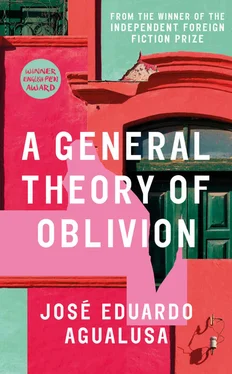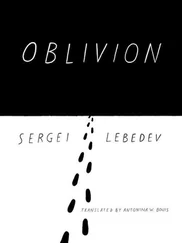‘There’s a bloodbath on the way.’
He agreed. He held her tight in a long hug, then went, dazed, into the torrential light of the streets. He considered looking for Madalena. He wanted to offer her his most profuse apologies. But he knew that this might cause her even more problems. Her house would be the first place the police would look for him. So he wandered the city, dazed, distressed, now following — at a distance — the groups of protestors, now accompanying the movements of the forces loyal to the president. He was walking this way and that, ever more lost, when a soldier recognised him. The man started to chase after him, crying ‘Fractionist! Fractionist!’ and within moments a crowd had assembled to run him down. Little Chief was a metre eighty-five tall, with long legs. During his adolescence he had been an athlete. The months he’d spent in a narrow cell, however, had made him shorter of breath. For the first five hundred metres he managed to get some distance between himself and his pursuers. He even believed that he would shake them off. Unfortunately, the commotion attracted yet more people. He felt his chest bursting. Sweat was running into his eyes, clouding his sight. A bicycle sprung out, suddenly, in front of him. He wasn’t able to dodge past and fell on top of it. He got up, grabbed hold of it and once more managed to gain some distance. He veered right. A dead end. He left the bicycle and tried to jump the wall. A stone hit him on the back of the neck. He felt the taste of blood in his mouth, dizziness. The next moment he was in a car, handcuffed, a soldier on each side, and everybody shouting.
‘You’re going to die, reptile!’ yelled the one who was driving. ‘We’ve got orders to kill you all. But first I’m going to pull out your nails, one by one, till you tell us everything you know. I want those fractionists’ names.’
He didn’t pull out any of his nails at all. A lorry crashed into them at the next junction, throwing the car against the pavement. The door furthest from the collision opened, and Little Chief was spat out along with one of the soldiers. With some difficulty he got up, scattering blood, his own and others’, and shards of glass. He didn’t even have time to understand what was happening. A stocky guy with a smile that seemed to gleam with sixty-four teeth approached him, put a coat over him to hide the handcuffs, and dragged him away. Fifteen minutes later, the two of them went into a building that was elegant, albeit rather dilapidated. They climbed eleven floors on foot, Little Chief limping badly, as his right leg had nearly been broken.
The elevators weren’t working, the man with the brilliant smile apologised:
‘These hicks toss their rubbish into the elevator shaft. There’s rubbish almost all the way up.’
He invited him in. On the living room wall, which was painted a shocking pink, there was a very conspicuous oil painting depicting, with naïve brushstrokes, the happy owner. There were two women sitting on the floor beside a small, battery-powered radio. One of them, who was very young, was breastfeeding a baby. Neither paid him any notice. The man with the brilliant smile pulled over a chair. He gestured to Little Chief to sit down. He took a paperclip from his pocket and straightened it out, then he leaned over the handcuffs, inserted the wire into the lock, counted to three, and opened it. He shouted something in Lingala. The older woman got up, without a word, and disappeared into the apartment. She returned, some minutes later, with two bottles of Cuca beer. An irate voice was yelling on the radio:
We must find them, tie them up and shoot them!
The man with the brilliant smile shook his head:
‘This wasn’t what we made our Independence for. Not for Angolans to kill one another like rabid dogs.’ He sighed. ‘Now we must treat your injuries. Then, rest. We have an extra room. You will stay there till the chaos is over.’
‘It could take quite some time for the chaos to be over.’
‘But end it will, comrade. Even evil needs to take a rest sometimes.’
In the first months of her isolation, Ludo only rarely went without the security of her umbrella when she visited the terrace. Later, she began using a long cardboard box, in which she had cut two holes at eye level for looking through, and two others to the sides, lower down, to keep her arms free. Thus equipped, she could work on the flowerbeds, planting, picking, weeding. From time to time she would lean out over the terrace wall, bitterly studying the submerged city. Anybody looking at the building from another of a similar height would see a large box moving around, leaning out and drawing itself back in again.
Clouds surrounded the city, like jellyfish.
They reminded Ludo of jellyfish.
When people look at clouds they do not see their real shape, which is no shape at all, or maybe every shape, because they are constantly changing. They see whatever it is that their heart yearns for.
You don’t like that word — ‘heart’?
Very well, choose another, then: soul, unconscious, fantasy, whatever you think best. None of them will be quite the right word.
Ludo watched the clouds and she saw jellyfish.
She had got into the habit of talking to herself, saying the same words over and over for hours on end: Chirping. Flocking. Twittering. Hovering. Flight. Chirping. Flocking. Twittering. Hovering. Flight. Chirping. Flocking. Twittering. Hovering. Flight. Chirping. Flocking. Twittering. Hovering. Flight. Chirping. Flocking. Twittering. Hovering. Flight. Good words, which dissolved like chocolate on the roof of her mouth and brought happy memories to mind. She believed that as she said them, as she evoked them, birds would return to the skies of Luanda. It had been years since she’d seen pigeons, seagulls. Not so much as one lost little bird. Night-time brought bats. The flight of bats, however, has nothing to do with the flight of birds. Bats, like jellyfish, are beings of no substance. See a bat streaking across the shadows and you don’t think of it as a thing of flesh, of blood, of concrete bones and heat and sensations. Elusive shapes, quick ghosts amid the ruins, they’re there, now they’re gone. Ludo hated bats. Dogs were rarer than pigeons, and cats rarer than dogs. The cats were the first to disappear. The dogs held out on the city streets for some years. Wild packs of pedigree dogs. Gangly greyhounds, heavy asthmatic mastiffs, demented Dalmatians, disappointed pointers, and then, for another two or three years, the unlikely and despicable mixing of these many and once-so-noble pedigrees.
Ludo sighed. She sat down facing the window. From there she could see only the sky. Low, dark clouds, and remnants of a blue almost completely defeated by the darkness. She remembered Che Guevara. She had grown used to seeing him, gliding along the walls, running across patios and rooftops, seeking refuge in the highest branches of the enormous mulemba tree. It had done her good to see him. They were closely related beings, both of them mistakes, foreign bodies in the exultant organism of this city. People had thrown stones at the monkey. Others would throw poisoned fruit. The animal avoided it. He would sniff at the fruit and then move away with an expression of disgust. Shifting position slightly, Ludo could look at the satellite dishes. Dozens, hundreds, thousands of them, covering the rooftops of the buildings like a fungus. For a long time she had seen all of them turned towards the north. All of them, except one — the rebel aerial. Another mistake. She used to think she wouldn’t die as long as that aerial kept its back to its companions. As long as Che Guevara survived, she wouldn’t die. It had been more than two weeks, however, since she’d last seen the monkey, and in the early hours of that morning, as she first glanced out over the rooftops, she saw the aerial turned northward — like the others. A darkness, thick and burbling, like a river, spilled down over the windowpanes. Suddenly a great flash lit everything up, and the woman saw her own shadow thrown against the wall. The thunderclap reverberated a second later. She shut her eyes. If she died here, like this, in a lucid moment, while out there the sky was dancing, triumphant and free, that would be good. Decades would go by before anyone found her. She thought about Aveiro, and realised that she had stopped feeling Portuguese. She didn’t belong to anywhere. Over there, where she had been born, it was cold. She could see them again, the narrow streets, people walking, heads down against the wind and their own weariness. Nobody was waiting for her.
Читать дальше












